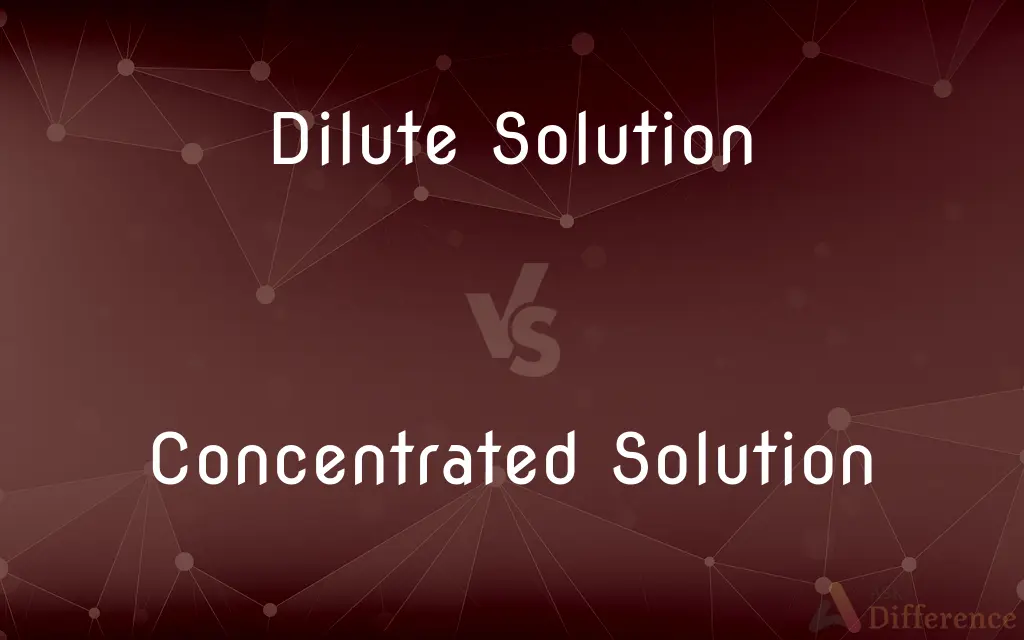Dilute Solution vs. Concentrated Solution — What's the Difference?
Edited by Tayyaba Rehman — By Fiza Rafique — Published on November 1, 2023
A Dilute Solution has a low solute concentration compared to the solvent, while a Concentrated Solution has a high solute concentration relative to the solvent.

Difference Between Dilute Solution and Concentrated Solution
Table of Contents
ADVERTISEMENT
Key Differences
In the realm of chemistry, when one hears about a Dilute Solution, it refers to a mixture where a small amount of solute is dissolved in a solvent. Conversely, a Concentrated Solution signifies that a significant amount of solute is present in the solvent.
To understand the Dilute Solution and Concentrated Solution better, think about making a lemonade drink. When only a little lemon juice is added to a large quantity of water, the result is a Dilute Solution. On the other hand, if a substantial amount of lemon juice is mixed with a smaller amount of water, the outcome is a Concentrated Solution.
The terms Dilute Solution and Concentrated Solution are relative. This means that the concentration is not an absolute measure but is rather compared to other solutions. A Dilute Solution can become a Concentrated Solution if more solute is added, and vice versa.
It's essential to note that while the Dilute Solution usually has lesser potency or strength due to the low solute quantity, the Concentrated Solution typically exhibits greater potency because of the high solute content. This principle applies in various scenarios, from beverage preparation to pharmaceutical drug formulation.
Safety precautions often accompany Concentrated Solutions. Given their high solute content, they can be caustic or harmful. On the flip side, Dilute Solutions are generally less hazardous due to their reduced potency, but this doesn't negate the need for careful handling in specific applications.
ADVERTISEMENT
Comparison Chart
Solute Concentration
Low
High
Potency/Strength
Typically weaker
Typically stronger
Relative Term
Yes, depends on comparison
Yes, depends on comparison
Safety Precautions
Generally less hazardous
Often requires more caution
Alteration
Can be made concentrated by adding solute
Can be made dilute by adding more solvent
Compare with Definitions
Dilute Solution
A less potent or weaker formulation due to reduced solute content.
The Dilute Solution of acid was safe to touch.
Concentrated Solution
A mixture where solute concentration is notably high.
The cleaning agent was a Concentrated Solution, so I had to dilute it.
Dilute Solution
A solution usually requiring lesser safety precautions.
Students started with a Dilute Solution before handling concentrated chemicals.
Concentrated Solution
A solution that can become dilute by adding more solvent.
By adding water, I turned the Concentrated Solution into a milder one.
Dilute Solution
A solution with a small amount of solute compared to the solvent.
I made a Dilute Solution of salt water for the experiment.
Concentrated Solution
A solution with a high amount of solute relative to the solvent.
The syrup was a Concentrated Solution of sugar in water.
Dilute Solution
A mixture where solute concentration is relatively low.
The lemonade tasted weak because it was a Dilute Solution.
Concentrated Solution
A solution that often demands greater safety precautions.
Wearing gloves is recommended when handling this Concentrated Solution.
Dilute Solution
A solution that can be made concentrated by increasing the solute amount.
By adding more sugar, I can change this Dilute Solution into a concentrated one.
Concentrated Solution
A potent or stronger mixture due to increased solute content.
The Concentrated Solution of the drug acted rapidly.
Common Curiosities
What is a Dilute Solution?
A Dilute Solution has a low concentration of solute relative to the solvent.
How does a Concentrated Solution differ from a Dilute Solution?
A Concentrated Solution has a high solute concentration, while a Dilute Solution has a low concentration.
Can I change a Dilute Solution to a Concentrated Solution?
Yes, by adding more solute, a Dilute Solution can become a Concentrated Solution.
Can adding water turn a Concentrated Solution into a Dilute Solution?
Yes, adding solvent, like water, can dilute a Concentrated Solution.
Is it safer to handle a Dilute Solution compared to a Concentrated Solution?
Generally, a Dilute Solution is less hazardous, but safety precautions depend on the specific chemical.
What is the significance of concentration in solutions?
Concentration determines the potency, reactivity, and behavior of a solution in various applications.
Can a Dilute Solution exhibit the same effects as a Concentrated Solution?
Not always; a Dilute Solution usually has lesser effects due to its reduced solute content compared to a Concentrated Solution.
Why are Concentrated Solutions often labeled with caution?
Concentrated Solutions often pose a higher risk due to their high solute content and potency.
Are there units to measure the concentration of solutions?
Yes, concentration can be measured in units like molarity, molality, and percentage composition.
Why might one choose a Dilute Solution over a Concentrated Solution for an experiment?
A Dilute Solution may be chosen for safety reasons, specific experimental requirements, or to achieve desired results.
Is a Concentrated Solution always more potent than a Dilute Solution?
Typically, a Concentrated Solution is more potent due to its high solute content compared to a Dilute Solution.
Does the nature of the solvent impact the concentration?
Yes, the nature and amount of solvent can affect the solubility and concentration of the solute.
Is concentration a fixed property of solutions?
No, concentration can be altered by adding more solute or solvent to a solution.
Can both types of solutions be used in the same applications?
It depends on the purpose; some applications may require a Concentrated Solution, while others might need a Dilute Solution.
What role does temperature play in solution concentration?
Temperature can influence solubility, which in turn affects the concentration of the solution.
Share Your Discovery

Previous Comparison
DHTML vs. HTML5
Next Comparison
Job Title vs. OccupationAuthor Spotlight
Written by
Fiza RafiqueFiza Rafique is a skilled content writer at AskDifference.com, where she meticulously refines and enhances written pieces. Drawing from her vast editorial expertise, Fiza ensures clarity, accuracy, and precision in every article. Passionate about language, she continually seeks to elevate the quality of content for readers worldwide.
Edited by
Tayyaba RehmanTayyaba Rehman is a distinguished writer, currently serving as a primary contributor to askdifference.com. As a researcher in semantics and etymology, Tayyaba's passion for the complexity of languages and their distinctions has found a perfect home on the platform. Tayyaba delves into the intricacies of language, distinguishing between commonly confused words and phrases, thereby providing clarity for readers worldwide.














































